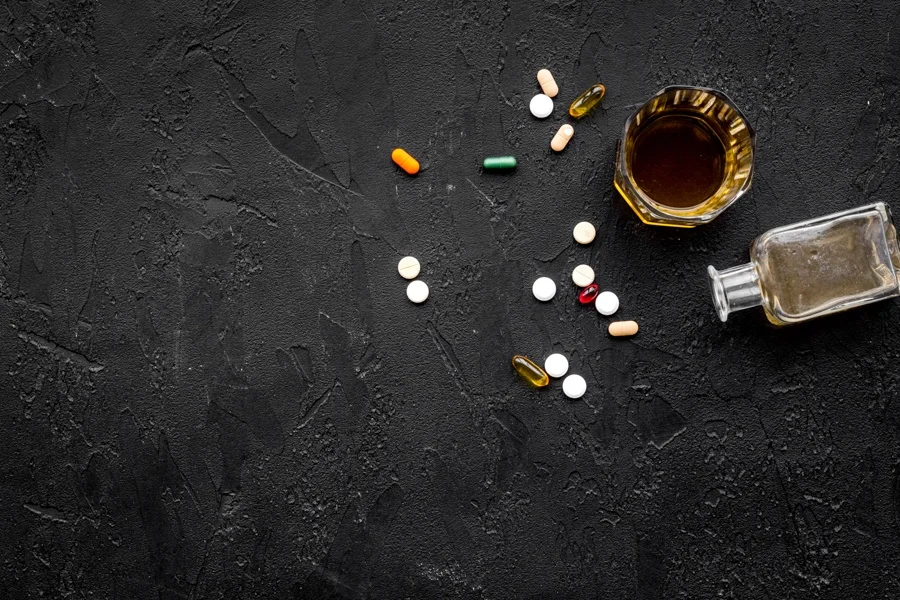Substance use disorders and behavioral addictions are the primary forms of addiction.
Addiction is accompanied by a host of risk factors. Risks vary from person to person and determine how likely a person is to form a substance use disorder or behavioral addiction. Such factors can include family problems, career difficulties, abuse, social problems, and others.
Recovery from addiction is possible. This article presents an in-depth look into the addiction cycle and how you can break free and regain control of your life.
What is an Addiction?

An addiction is a chronic disease that affects the brain’s reward center, motivation, and memory circuits. The primary risk factor for developing a substance use disorder is a person’s genetics. A person whose family history includes cases of the disease is at a much higher risk of developing a substance use disorder than the public at large.
When the word “addiction” is mentioned, people generally think of drugs, nicotine, or alcohol. Addictions can, however, take very many forms.
Various non-drug related addictions a person can have are:
- Exercise
- Gambling
- Risky sex
- Pornography
- Food
- Internet (particularly social media)
- Mobile devices
- Shopping
- Caffeine
- Anger (rage addiction)
- Eating
- Thrills (adrenalin junkies)
- Gaming
Similar to other chronic diseases such as asthma, diabetes, and hypertension, addiction usually involves relapse and remission cycles. It’s important to get addiction treatment in a luxury rehab program in Los Angeles, such as ours at Westwind Recovery® if you struggle with substance use.
What are the Stages of Addiction?
Recovery programs offer the pathway to a healthy life, where individuals can break free from harmful habits. The journey of recovery is a continual process, taking months, years, or even decades. It involves recognizing the addiction cycle’s grip, but with determination, one can overcome challenges and embrace a brighter future.
The process of cravings, use, and withdrawal symptoms is known as the addiction cycle, but through dedicated efforts, individuals can transcend it and discover a life of renewed possibilities.
There are six distinct stages to the addiction cycle:
An addiction can take root from the very first use. Substances can be introduced to a person in various ways, such as through a family history of substance abuse, social situations, peer pressure, and others. A person could begin using substances or engaging in activities to cope with stress or escape from reality or even find a measure of happiness in their life.
After that first high comes the “coming down”, where the person may feel disappointment or discomfort that the euphoric feeling is disappearing. These feelings will push the person to use the substance more or engage in the activity to regain the high feeling and return the happiness. This leads to abuse, which is the second stage of addiction.
In this stage, a person persists in using the drug to maintain a euphoric state, leading to the development of tolerance and dependence, resulting in excessive use at higher doses.
Individuals may turn to prescription drugs in an attempt to self-medicate, ultimately adopting substance abuse as a new lifestyle, consumed by managing cravings. This escalation in usage creates a tolerance to the drug/activity, marking the next stage of addiction.
This stage is where an individual has been taking the substance or engaging in the activity for so long that the brain’s response has been diminished and the dopamine released with participation is a lot less than it was at first use.
The apparent solution for a person addicted to alcohol or drugs is to increase engagement or dosage levels to replicate the initial “high” they experienced. Some may resort to quicker methods of intake like snorting or injecting. Additionally, experimentation with harder drugs may occur.
As the brain adapts to the drug, this psychological stage becomes a stepping stone to dependence, the next stage of addiction.
In this stage, the user grows extremely dependent on the drugs or alcohol they’re using and they often cannot find any happiness without using the substance. A person becoming dependent on a drug for medical purposes is not an addiction, however.
The symptoms of dependency on a substance are:
- Using/engaging in inappropriate areas (work, school, etc)
- Experiencing family or relationship problems
- Devoting more time to the search for the substance
- Increased cravings for the substance
- Less time spent on social activities
- Withdrawal symptoms
Addicts can suffer withdrawal symptoms at this stage when they are deprived of the substance. Withdrawal symptoms vary with substance type and behavioral activity.
Some common symptoms of withdrawal can be:
- Increased hostility
- Depression and thoughts of suicide or self-harm
- Nausea
- Fatigue
- Bodily pains
- Anxiety
In an attempt to find momentary relief, addicts may resort to using more of the substance or engaging in more addictive behaviors. The symptoms may be abated slightly, but this pushes an individual deeper into the cycle of addiction. This in turn increases the intensity of the symptoms.
This is almost the end stage, where a person realizes that they have a drug or alcohol use problem. By this stage, the addiction is affecting the person’s finances, social life, and health.
There are 11 signs or symptoms of addiction:
- Increased substance use (or involved participation, in the event of activities like gambling)
- Increased difficulties with attempts to abstain from using the substance
- Growing cravings for the substance
- More time spent using the substance or engaging in the activity
- Withdrawal symptoms upon attempts to stop engaging/using
- Building tolerance levels
- Continued use even though it damages relationships
- Continued use even though it leads to health problems (erratic sleep, depression, anxiety, blackouts, etc.)
- Increased time spent engaging in activity or drug use
- Using substances in unsuitable areas and at inappropriate times
- Using in hazardous areas
Displaying at least two of the above symptoms within twelve months will cause a person to be diagnosed with substance use disorder.
This is the conclusive addiction stage. Extreme withdrawal symptoms are experienced by the person going through the addiction. An overbearing and all-consuming need rises within the person to get ahold of the substance to regain happiness and a sense of control over themselves. This takes a person right back down to stage dependence.
How to Interrupt the Cycle?

The cycle of addiction is a behavioral pattern that includes cravings, using, engaging, and withdrawal symptoms. Interrupting the cycle requires an addict to identify the triggers that lead to the cycle and find alternative methods of coping. This is where professional help can help make this process much easier. Through behavioral therapy, such as cognitive-behavioral therapy for substance abuse, an individual can examine their drug and alcohol use and work on building positive behaviors to stop using.
What are the Stages of Breaking the Cycle of Addiction?

There are 5 steps involved in recognizing addiction and deciding to get substance abuse treatment.
These stages are:
- Pre-contemplation. In this stage, an addict has not yet considered halting their actions, though they may begin to see signs of how their addiction is affecting their life.
- Contemplation. At this stage, an individual realizes the adverse consequences of addiction on their life and health and starts to seriously think about giving up substance use or indulging in harmful activities.
- Preparation. This moment is when an addict gets ready to seek help and make a meaningful change in their life.
- Action. The addict now actively stops using and looks for assistance.
- Maintenance. The addict follows a personalized recovery program and stays on the straight and narrow.
How Does Alcohol and Drug Addiction Affect the Brain?
The chemical compounds within drugs and alcohol affect the way the brain and certain neurotransmitters function. These alterations to the brain’s chemistry result in tolerance, addiction, cravings, and withdrawal symptoms.
Dopamine and serotonin are the happiness and pleasure-regulating neurotransmitters that run messages between the brain and the rest of the body. The brain of an addict requires continual and sustained doses of the chemical or activity to function both physiologically as well as psychologically.
This resulting chemical dependence evolves tolerance levels and fosters withdrawal symptoms, which are the two definitive signs of substance abuse addiction or behavioral addiction.
The altered brain chemistry affects the thought processors and decision-making centers of the brain. Internal defense mechanisms, mainly minimization, justification, and denial, get activated due to the changes in brain chemistry.
Post-acknowledgment of an addiction, an addict may break the cycle of addiction by forcibly stopping using chemicals. The brain, in its altered, abnormal state, will not allow that decision and fight it with full strength. This builds cravings to excruciating levels and forces an addict to hunt for the chemicals that ease the symptoms.
How to Get Assistance for Addiction

When an addict reaches stage 5 of breaking the addiction cycle, perception, it is imperative that they seek professional help. The road to recovery is not linear, and a person struggling with addiction can move through several attempts and fall back into the cycle.
Proper treatment programs can help most people enrolled in them to manage substance use disorder successfully and live a healthy and fulfilling life. Most people who enroll in a proper treatment program progress in improving their occupational, psychological, and social functioning, in addition to halting the use of substances or engaging in harmful activities.
Inpatient programs are the recommended treatment method for addicts suffering from moderate to severe addiction.
At Westwind Recovery® in Los Angeles, we offer outpatient treatment for those who have already progressed through the inpatient program or who have a mild addiction. Our intensive outpatient program for substance abuse is a comprehensive treatment that includes several therapeutic modalities, and it provides intensive care in a more flexible setting than residential care.
You can also get dual diagnosis treatment at Westwind Recovery® if you suffer from substance use disorder and co-occurring mental health disorders such as anxiety, depression, or post-traumatic stress disorder (PTSD).
Psychotherapy (talk therapy) is another treatment that is available for substance use disorder as well as other mental health issues a person may be facing.
There are multitudes of people who are a testament that treatment programs work when followed and that you can recover from addiction and live a very meaningful and joyful life. Relationships can be mended, families can heal and your well-being can be vastly improved.
Westwind Recovery® Can Assist You with Addiction

If you or a loved one are living with a substance use disorder, things may feel out of control or overwhelming. Westwind Recovery® is here to lend a helping hand and help you get your life back on track. There is always hope for recovery as long as you are willing to make a change.
Without professional treatment modalities and resident programs, your journey to recovery will be supported by caring staff and medically supervised by our in-house professionals at every step. Contact us today to enquire about admissions and make that first step to living a healthy and fulfilling life.

Dr. Deena is the Chief Clinical Officer of Westwind Recovery®, an award-winning outpatient treatment center in Los Angeles where she oversees the clinical and administrative program and treatment methods. Dr. Deena is a doctor of psychology and licensed clinical social worker since 1993. LCSW #20628. Originally from the East Coast, Dr. Deena has worked running treatment centers, worked as a therapist in psychiatric hospitals as well as school settings and currently has a thriving private practice in the LA area. Dr. Deena has appeared regularly on the Dr. Phil Show as an expert since 2003. She has also been featured on many other TV shows, podcasts and has contributed to written publications as well as podcasts.




